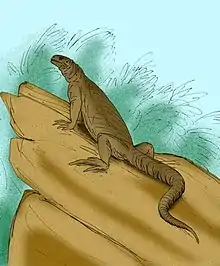| Paraplacosauriops Temporal range: middle Eocene | |
|---|---|
| Scientific classification | |
| Domain: | Eukaryota |
| Kingdom: | Animalia |
| Phylum: | Chordata |
| Class: | Reptilia |
| Order: | Squamata |
| Family: | Anguidae |
| Subfamily: | †Glyptosaurinae |
| Genus: | †Paraplacosauriops Auge and Sullivan, 2006 |
| Type species | |
| †Paraplacosauriops quercyi Filhol, 1882 | |
Paraplacosauriops (near Placosauriops) is an extinct genus of anguid lizards from the middle Eocene of France.
Taxonomy
Paraplacosauriops was originally named Plestiodon quercyi by Filhol (1882) on the basis of dentary remains from fissure fill deposits in Quercy, France.[1] Hoffstetter (1944) referred P. quercyi to the glyptosaurine genus Placosaurus, which is likewise endemic to Europe.[2] However, Auge and Sullivan (2006) recognized quercyi as belonging to the tribe Melanosaurini and not a Placosaurus-like glyptosaurin, so they erected Paraplacosauriops for P. quercyi.[3]
Description
Distinguishing features of Paraplacosauriops include a distinguishing heterodont dentition, especially the anterior teeth being extremely slender, pointed and not peg-like.[3]
References
- ↑ Filhol, H. 1882. Description d'un genre nouveau de Reptile fossile et note sur une espèce de Reptile fossile du genre Plestiodon. Bulletin de la Société Philomathique de Paris, 6: 127.
- ↑ Hoffstetter, R. 1944. Sur les Scincidae fossiles. 1. Formes Européennes et Nord-Américaines. Bulletin du Muséum National d'Histoire Naturelle, 16: 547–553.
- 1 2 R. M. Sullivan and M. Augé. 2006. Redescription of the holotype of Placosaurus rugosus gervais 1848–1852 (Squamata, Anguidae, Glyptosaurinae) from the Eocene of France and a revision of the genus. Journal of Vertebrate Paleontology 26(1):127-132
This article is issued from Wikipedia. The text is licensed under Creative Commons - Attribution - Sharealike. Additional terms may apply for the media files.
